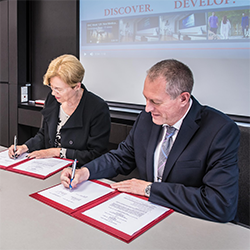The Next Evolution in Health Care
The University of Arizona College of Medicine – Phoenix recently signed a formal partnership with Nanyang Technological University in Singapore to establish a satellite office that will connect researchers in Phoenix with one of the leading technology hubs in the world — Asia.
 The partnership between the two universities will focus on developing the next generation of wearable technology, according to Frederic Zenhausern, PhD, MBA, a professor and director of the Center for Applied Nanobioscience and Medicine at the UA College of Medicine – Phoenix, who signed the partnership agreement. Dr. Zenhausern’s vision is to reshape health care by developing state-of-the-art biotechnology.
The partnership between the two universities will focus on developing the next generation of wearable technology, according to Frederic Zenhausern, PhD, MBA, a professor and director of the Center for Applied Nanobioscience and Medicine at the UA College of Medicine – Phoenix, who signed the partnership agreement. Dr. Zenhausern’s vision is to reshape health care by developing state-of-the-art biotechnology.
“Ensuring the quality, safety and continuous communication of real-time health data information is paramount to the future of digital and mobile health delivery,” Dr. Zenhausern said.
The Health Innovation Design Engineering Alliance (HiDEA) will allow UA researchers to work with scientists at Nanyang’s School of Art, Design and Media to develop wearables that can sense, compute, communicate and seamlessly integrate into health delivery systems that will transform the patient experience.
“These unprecedented capabilities will be enabled by innovative approaches in designing wearable sensors, bio-art and bio-design research with wide-ranging applications in smart and sustainable textiles,” Dr. Zenhausern said.
The alliance between UA and the Singapore university opens the door for more research funding and presents a tremendous opportunity for the University of Arizona to lead efforts in precision health and personalized medicine.
An initial satellite location will be established in Singapore with Zenhausern and Vibeke Sorensen, professor and chair of the School of Art, Design and Media at Nanyang Technological University, serving as executive coordinators. Sorensen is a former professor at Arizona State University’s Institute for Studies of the Fine Arts.
The hope is that other universities, companies and researchers will join the alliance, establishing international locations on their campuses.
The Center for Applied Nanobioscience and Medicine will provide students and engineering staff with expertise in electronics, molecular biology and device manufacturing to support design students, faculty members and other research staff from Nanyang, as well as corporate partners in Singapore.
Media Contact:
Marian Frank
Phone: 602-827-2022
About the College
Founded in 2007, the University of Arizona College of Medicine – Phoenix inspires and trains exemplary physicians, scientists and leaders to advance its core missions in education, research, clinical care and service to communities across Arizona. The college’s strength lies in our collaborations and partnerships with clinical affiliates, community organizations and industry sponsors. With our primary affiliate, Banner Health, we are recognized as the premier academic medical center in Phoenix. As an anchor institution of the Phoenix Bioscience Core, the college is home to signature research programs in neurosciences, cardiopulmonary diseases, immunology, informatics and metabolism. These focus areas uniquely position us to drive biomedical research and bolster economic development in the region.
As an urban institution with strong roots in rural and tribal health, the college has graduated more than 1,000 physicians and matriculates 130 students each year. Greater than 60% of matriculating students are from Arizona and many continue training at our GME sponsored residency programs, ultimately pursuing local academic and community-based opportunities. While our traditional four-year program continues to thrive, we will launch our recently approved accelerated three-year medical student curriculum with exclusive focus on primary care. This program is designed to further enhance workforce retention needs across Arizona.
The college has embarked on our strategic plan for 2025 to 2030. Learn more.